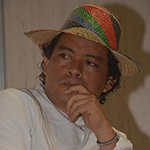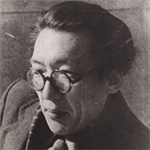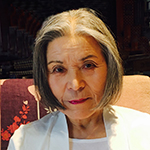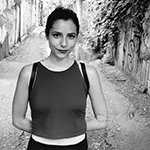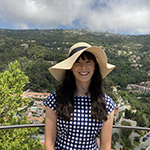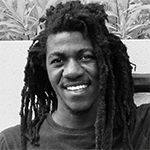Wor(l)ds in Flight: Three Poems
Dream
We lie in a sea-deep lake
Knowing nothing of sorrow and heartache
We embrace and encase ourselves
And waterlilies circle us and draw
Rings – We strive and wish and want no more
We have no cravings.
Love, something’s missing still,
A wish that’s unfulfilled:
The desire for desire…
Ein Traum
Wir liegen in einem tiefem See
Und wissen nichts von Leid und Weh.
Wir halten uns umfangen
Und Wasserrosen rings um uns her.
Wir streben und wünschen und wollen nichts mehr.
Wir haben kein Verlangen.
Geliebter, etwas fehlt mir doch,
Einen Wunsch, den hab ich noch:
Die Sehnsucht nach der Sehnsucht.
Hypnosis
My flesh aches somewhere in a strange
Land,
I no longer feel my body
Feet like lead—so heavy,
Breast hollow, burned-out and branded
I don’t hurt, and yet I’m full of pain.
I look into your eyes spellbound.
I fall into a sleep, candles flicker and flame,
They light my way into the unknown land.
Hypnose
Mein Leib schmerzt, irgendwo in einem fremden
Land,
Ich fühle meinen Körper längst nicht mehr,
Die Füße sind wie Blei so schwer,
Die Brust ist hohl und ausgebrannt,
Mir tut nichts weh und bin doch voller Schmerzen,
Ich seh in deine Augen wie gebannt.
Ich fall in Schlaf, es flammen Kerzen
Sie leuchten mir ins unbekannte Land.
In hospital
All autumns pass over me.
Lying ill in a white room,
Wishing dearly to be dancing.
Always thinking of violin tunes
And a thousand flickering lights.
O, how pretty I am today!
Faces painted so brightly
Dancing past me so fast.
O, so many wilted roses,
carried home each night
crushed by caresses
tenderly arranged in the morning.
And I remember the girls,
Vagabonds like me—love makers,
Singing of some mythic homeland
Through tears of laughter and heartbreak.
Yet now I lie abandoned—stranded
In a white room—a blank screen.
O, my sisters of the streets,
Come to me tonight in a dream!
Im Krankenhause
Alle Herbste gehn an mir vorüber.
Krank lieg ich im weißen Zimmer,
Tanzen möchte ich wohl lieber.
An die Geigen denk ich immer.
Und es flimmern tausend Lichter.
O, wie bin ich heute schön!
Bunt geschminkte Angesichter
Schnell im Tanz vorüberwehn.
O, die vielen welken Rosen,
Die ich nachts nach Haus getragen,
Die zerdrückt vom vielen Kosen
Morgens auf dem Tische lagen.
An die Mädchen denk ich wieder,
Die wie ich die Liebe machen.
Wenn wir sangen Heimatlieder,
Unter Weinen, unter Lachen,
Und jetzt lieg ich ganz verlassen
In dem stillen weißen Raum.
O, ihr Schwestern von den Gassen,
Kommt zu mir des Nachts im Traum!
Translator’s Note:
These poems are from Emmy Hennings’s first collection, Die letzte Freude / The last Joy (1913), a title that conjures a host of compelling allusions: the reference to last joy might evoke eschatological associations, implying the author’s interest in religion and renewal, as well as her historical context at the eve of the First World War. However, these words—letzte Freude—might equally connote an orgasmic petite mort, and are highly suggestive of one of the collection’s leitmotifs—sex work and the life of Freudenmädchen, slang for women and girls who perform sex work. Hennings occasionally relied on sex work for money, and so it might be tempting to read these references autobiographically. Yet Hennings’s intervention in the (usually male-authored) “prostitute narrative” also gestures towards a critique of the economic and gendered mechanisms of exploitation, a theme throughout her oeuvre. Imagery relating to exploitation can be noticed in “Im Krankenhause,” in which the speaker remembers aspects of her life while convalescing from an illness implicitly related to sex work. While the blankness of the poem’s white room contrasts with the speaker’s colourful memories, the remembered scenes are also anti-romantic and inflected with imagery of (mis)use—the crushed roses, for instance. In Hennings’s German, she uses rhyme to pair streets (Gassen) with abandoned (verlassen). In an attempt to maintain these associations, I’ve inserted the word ‘stranded’ to echo abandoned and bring the relationship between topography and abandonment into sharper relief.
The poetic I’s memories of singing Heimatlieder with her comrades ironically connects the figure of the sex worker with a nationalist myth of Germany. Through the subversive image of the so-called “fallen” women singing Heimatlieder, Hennings seems to critique the provincialized innocence suggested by the term Heimat/ homeland, instead associating Germany with the unsentimental exchange and exploitation that the sex worker figure might signify. In my translation of “Im Krankenhause,” I’ve inserted the word ‘vagabond’ to gesture towards this subversive element and toward another ‘whore and vagabond’ of German literature, Courage—the picaresque protagonist of The Life of Courage: Thief, Whore and Vagabond (1670) by Johann Grimmelshausen, part of his Simplicissimus series of books. Hennings met her future husband, Hugo Ball, at Café Simplicissimus in Munich—where she performed and discussed art and politics with many other budding (or established) avant garde artists of the early twentieth century. Together with Ball, Tristan Tzara, Sophie Taeuber-Arp and others, Hennings founded the infamous Cabaret Voltaire, which opened its doors in Zurich in 1916 with Hennings performing her poem “Gefängnis”/ Prison on the opening night. Indeed, Hennings was a full participant and instigator in the Dada movement, though she has not received as much attention as her contemporaries. Descriptions of Hennings by her fellow Dadaists are far from flattering, and Erika Biddle points out that ‘the men in her inner circle undermined Hennings’, noting the way some friends dismissed her as a drug addict, or as uncommitted to the Dada spirit (Biddle 2007: 275). A contemporary reviewer refers to her ‘hysteria’ (Siurlai qtd. in Rugh 1981: 2), and later writers interested in the movement considered her work a vehicle for understanding Ball’s art, as opposed to reading it in its own right. The performative elements of her work and interest in dolls and puppetry might reflect the gender politics within the group, despite the Dadaist (cl)aim to undo such hierarchies. While the poetry translated here predates the Cabaret Voltaire, suggesting a bold poetic voice, Hennings often recited poetry written by other members of the group, particularly Ball’s. Such details add texture to Hennings’s poem ‘”Hypnose” in which the self is hollowed out, like a puppet. The hypnotic, light and dark quality of Hennings’s poetry recalls linguistically the chiaroscuro techniques used in expressionist film, and one might put her writing into dialogue with the widespread interest in somnambulism at the fin de siècle and first decades of the twentieth century. Such imagery implies the poet’s interest in personal and mass manipulation by means other than brute force.
In these translations, I’ve aimed to tread the line between faithfulness to Hennings’s meaning as well as spirit—making small changes to preserve rhymes and rhythms where possible, and shuffling or inserting the occasional new word in the spirit of transformation and flight woven throughout Hennings’s largely ignored poetry. Feminist intervention and scholarship have sought to bring Hennings’s writing into focus—and I suspect Chris Kraus’s reference to Hennings and Ball in her autofictional hit I Love Dick (1997) brought this overlooked Dadaist to the attention of many contemporary readers. Henning’s interest in theatricality, puppets, and performance marks a desire to escape rigid boundaries of gender that speaks to us across time. Yet, while Hennings’s writing might be easy for some to dismiss as autobiographical or confessional, upon a closer reading less fettered by a hermeneutics that privileges certain topics for art, we can read Hennings’s interest in feminine roles in more expansive ways. In Die letzte Freude readers can find and be affected by Hennings’s suspicion of nationalism, her fascination with mysticism, and a nuanced and conflicted relation to the mechanisms of the sometimes brutal, sometimes sublime, economies of desire.
References
Biddle, Erika (2007). ‘Better a One-Legged Man Than a Woman’, in Realizing the Impossible: Art Against Authority. Josh MacPhee and Erik Reuland (eds.). Oakland & Edinburgh: AK Press, pp. 272-284.
Rugh, T. (1981). Emmy Hennings and the Emergence of Zurich Dada, in Woman’s Art Journal. 2: 1, pp. 1-6.
Emmy Hennings née Corsden (1885-1948) played a formative role in the Dada movement and was a founding member of the Cabaret Voltaire. She was a performer who published poetry and two semi-autobiographical fictions, Gefängnis / Prison (1919) and Das Brandmal / The Branding (1920), which fictionalise the life of vagabond women—both troubled and troublesome. Hennings was married twice. First, to Joseph Hennings, with whom she had a son who died in infancy, and a daughter named Annemarie. Hennings later married the Dadaist poet Hugo Ball in 1920—the same year she converted to Catholicism. After Ball’s death in 1927, she dedicated much time to the loving promotion of his work. Hennings died in Switzerland in 1948.

Katie Jones is an academic with a particular interest in women’s life writing, and is currently working on a book exploring this topic with the working title Improper Subjects. She also writes poetry, and some her poems and publications can be found online and in print. She lives and works near the sea in Swansea, Wales. Find her on Instagram and Twitter.

 BACK TO ISSUE
BACK TO ISSUE

